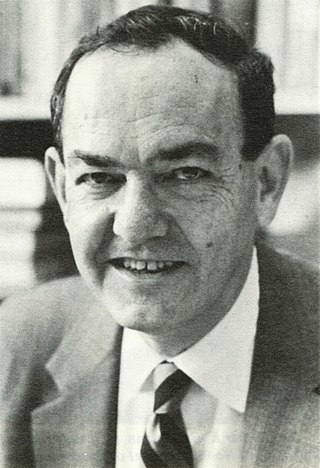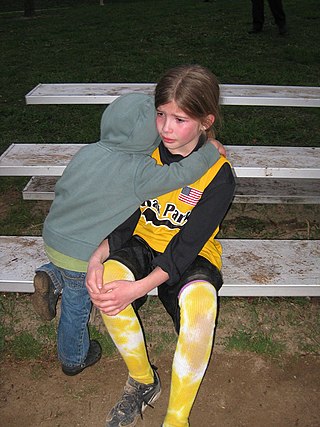Related Research Articles
Educational psychology is the branch of psychology concerned with the scientific study of human learning. The study of learning processes, from both cognitive and behavioral perspectives, allows researchers to understand individual differences in intelligence, cognitive development, affect, motivation, self-regulation, and self-concept, as well as their role in learning. The field of educational psychology relies heavily on quantitative methods, including testing and measurement, to enhance educational activities related to instructional design, classroom management, and assessment, which serve to facilitate learning processes in various educational settings across the lifespan.

Herbert Alexander Simon was an American political scientist whose work also influenced the fields of computer science, economics, and cognitive psychology. His primary research interest was decision-making within organizations and he is best known for the theories of "bounded rationality" and "satisficing". He received the Nobel Memorial Prize in Economic Sciences in 1978 and the Turing Award in computer science in 1975. His research was noted for its interdisciplinary nature, spanning the fields of cognitive science, computer science, public administration, management, and political science. He was at Carnegie Mellon University for most of his career, from 1949 to 2001, where he helped found the Carnegie Mellon School of Computer Science, one of the first such departments in the world.
Psychology is an academic and applied discipline involving the scientific study of human mental functions and behavior. Occasionally, in addition or opposition to employing the scientific method, it also relies on symbolic interpretation and critical analysis, although these traditions have tended to be less pronounced than in other social sciences, such as sociology. Psychologists study phenomena such as perception, cognition, emotion, personality, behavior, and interpersonal relationships. Some, especially depth psychologists, also study the unconscious mind.

An academic discipline or field of study is a branch of knowledge, taught and researched as part of higher education. A scholar's discipline is commonly defined by the university faculties and learned societies to which they belong and the academic journals in which they publish research.

Empathy is generally described as the ability to take on another's perspective, to understand, feel, and possibly share and respond to their experience. There are more definitions of empathy that include but is not limited to social, cognitive, and emotional processes primarily concerned with understanding others. Often times, empathy is considered to be a broad term, and broken down into more specific concepts and types that include cognitive empathy, emotional empathy, somatic empathy, and spiritual empathy.
The following outline is provided as an overview of and topical guide to psychology:
DISC assessments are behavioral self-assessment tools based on psychologist William Moulton Marston's DISC emotional and behavioral theory, first published in 1928. These assessments aim to improve job performance by categorizing individuals into four personality traits: dominance, inducement, submission, and compliance.

Psychodynamics, also known as psychodynamic psychology, in its broadest sense, is an approach to psychology that emphasizes systematic study of the psychological forces underlying human behavior, feelings, and emotions and how they might relate to early experience. It is especially interested in the dynamic relations between conscious motivation and unconscious motivation.
Character education is an umbrella term loosely used to describe the teaching of children and adults in a manner that will help them develop variously as moral, civic, good, mannered, behaved, non-bullying, healthy, critical, successful, traditional, compliant or socially acceptable beings. Concepts that now and in the past have fallen under this term include social and emotional learning, moral reasoning and cognitive development, life skills education, health education, violence prevention, critical thinking, ethical reasoning, and conflict resolution and mediation. Many of these are now considered failed programs, i.e. "religious education", "moral development", "values clarification".
The history of the social sciences has origin in the common stock of Western philosophy and shares various precursors, but began most intentionally in the early 18th century with the positivist philosophy of science. Since the mid-20th century, the term " social science" has come to refer more generally, not just to sociology, but to all those disciplines which analyze society and culture; from anthropology to psychology to media studies.

The following outline is provided as an overview of and topical guide to thought (thinking):
Values education is the process by which people give moral values to each other. According to Powney et al. It can be an activity that can take place in any human organisation. During which people are assisted by others, who may be older, in a condition experienced to make explicit our ethics in order to assess the effectiveness of these values and associated behaviour for their own and others' long term well-being, and to reflect on and acquire other values and behaviour which they recognise as being more effective for long term well-being of self and others. There is a difference between literacy and education.
Psychology encompasses a vast domain, and includes many different approaches to the study of mental processes and behavior. Below are the major areas of inquiry that taken together constitute psychology. A comprehensive list of the sub-fields and areas within psychology can be found at the list of psychology topics and list of psychology disciplines.
The Museum of the Creative Process is a museum and learning center dedicated to understanding the role of creativity as a conflict resolving mechanism. Founded and directed by Albert Levis, M.D., the museum brings together a global collection of contemporary and historical pieces of artwork. The museum is located on the grounds of the Wilburton Inn in Manchester, Vermont. The museum also holds traveling exhibits throughout New England.
The Animal Metaphor Test is a projective psychological test created by Albert J. Levis, the director and founder of the Museum of the Creative Process, in 1988. The Animal Metaphor Test is one of many tests that are part of Levis' Conflict Analysis Battery, a collection of psychological tests.
Henry Gorski (1918–2010) was an American Figurative Expressionist artist. Born in Buffalo, New York, of Polish descent, Gorski received his BFA from the University at Buffalo in 1939. Gorski lived in the New Haven, Connecticut, area, and was married to the textile artist Bernie Gorski.
The Wilburton Inn is a historic hotel, restaurant, and estate located in Manchester Village, Vermont.
The following outline is provided as an overview of and topical guide to social science:
Moral development focuses on the emergence, change, and understanding of morality from infancy through adulthood. The theory states that morality develops across a lifespan in a variety of ways and is influenced by an individual's experiences and behavior when faced with moral issues through different periods of physical and cognitive development. Morality concerns an individual's reforming sense of what is right and wrong; it is for this reason that young children have different moral judgment and character than that of a grown adult. Morality in itself is often a synonym for "rightness" or "goodness." It also refers to a specific code of conduct that is derived from one's culture, religion, or personal philosophy that guides one's actions, behaviors, and thoughts.
References
- ↑ "Wilburton Inn, Manchester Vermont, Inn, Lodging, Bed and Breakfast, Restaurant, Weddings, Retreats".
- ↑ Ph.D, Lisa Paul Streitfeld (2017-04-11). "ALBERT LEVIS, RENAISSANCE MAN FOR THE TRUMP ERA: INVENTOR OF A NEW SCIENCE". Huffington Post. Retrieved 2018-09-06.
- ↑ "The Proof is in the Painting".
- 1 2 3 "Teleion Holon".